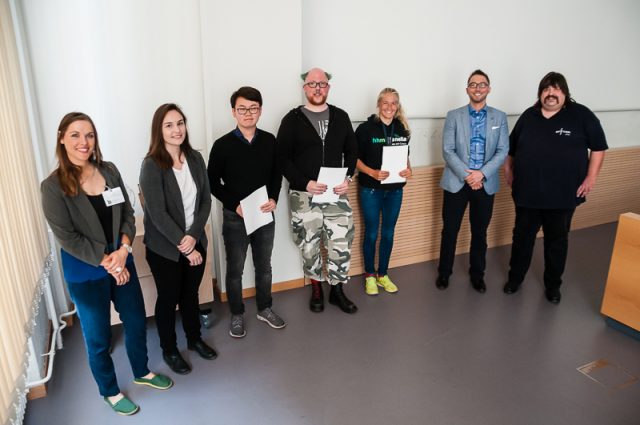During the recent meeting of the Young Crystallographers in Berlin, several poster prizes were awarded. One of the winners is Dennis Wiedemann. He finished his studies in chemistry at the Freie Universität Berlin in 2007. During his master studies, he focused on complex chemistry with his master thesis titled “Polynuclear Gold(I) Complexes with Aurophilic Interactions: Steps Towards Supramolecular Compounds”. Shortly after graduating, he moved to the Technische Universität Berlin to make his doctorate. He worked again in complex chemistry and graduated summa cum laude in 2013. The title of his PhD thesis is „Make One of Naught—Switchable Complexes of Novel Pyridine-Based Podands„. Since then, he stayed at Technische Universität Berlin as Post-Doc.
How did you start out working with neutron diffraction?
Well, it more or less fell into my lap. During the work on my doctoral thesis, I had already busied myself with X-ray diffraction on molecular single crystals and took a liking to the method. And liking something is one of the best preconditions to become good at it. So, one day, a colleague from the solid-state group one storey up contacted me with a crystallographic problem. I helped her to avoid a severe misinterpretation in a manuscript soon to be published.
That must have stuck to the group leader, Professor Lerch, because half a year later, he offered me a postdoc position with a crystallographic task description. He is experienced in neutron diffraction and was looking for somebody interested in multiple techniques. So, there I was, switching from X-rays and molecules to neutrons and solids. Actually, one does not simply say no to neutrons if one is fascinated by diffraction. Not many people get to use this awesome method …
Are you more interested in the methods of neutron diffraction or in atomic diffusion processes?
When I started my work on the subject, I was more interested in the diffusion processes. But as I dived deeper into the analytical methods, I have grown quite fond of them for their own sake. So, recently, I have been working on my methodological portfolio with pleasure and feel I could still do with one or two additional approaches. However, any new
method takes time to get acquainted with and there is not much to gain from just learning about them an their backgrounds. So, the next subject is already at hand and its focus will definitely be the application to atomic processes in solids.
What was the largest obstacle you had encountered in your research project and how did you overcome it?
The problem that data quality is not always (let me be heretical: often not) what you expect it to be. Not only does this cause frustration, but it also poses a scientific challenge: How much information can you extract from your data without over-interpretation? Sure, if you have perfect data, you can do all sorts of nifty high-end analyses with them. But if you do not, well, then “methodological diversity” might be the answer. At least, for me it was. I have learned a few methods with different demands for data quality, so I have a suitable tool at hand most of the time. The downside: one has to be an autodidact and an eager reader.
What was most your favourite part of the meeting?
Within the scientific programme: the lightning talks and poster session. It was great that many participants talked about their professional everyday struggles or failures instead of presenting those nice-and-shiny results, which we are all used to and sometimes bored by on other conferences (Somehow, it is troubling that this even strikes me as “great” instead of “normal”). Talking about such aspects, we can get new impulses from others, who maybe had similar problems or have a completely different view on the subject. Plus, from time to time, it is good to be reminded that other people also put their trousers on one leg at a time.
Left to right: Yulia Ilina (Berlin, Organizer), Lilith Domnik (Berlin, Organizer), Wei Meng (Cambridge, UK, Poster Prize Winner), Dennis Wiedemann (Berlin, Poster Prize Winner), Greta Assmann (Konstanz, Poster Prize Winner), Oliver Pecher (Cambridge, UK, Organizer), Thomas Hartmann (Darmstadt, STOE)
